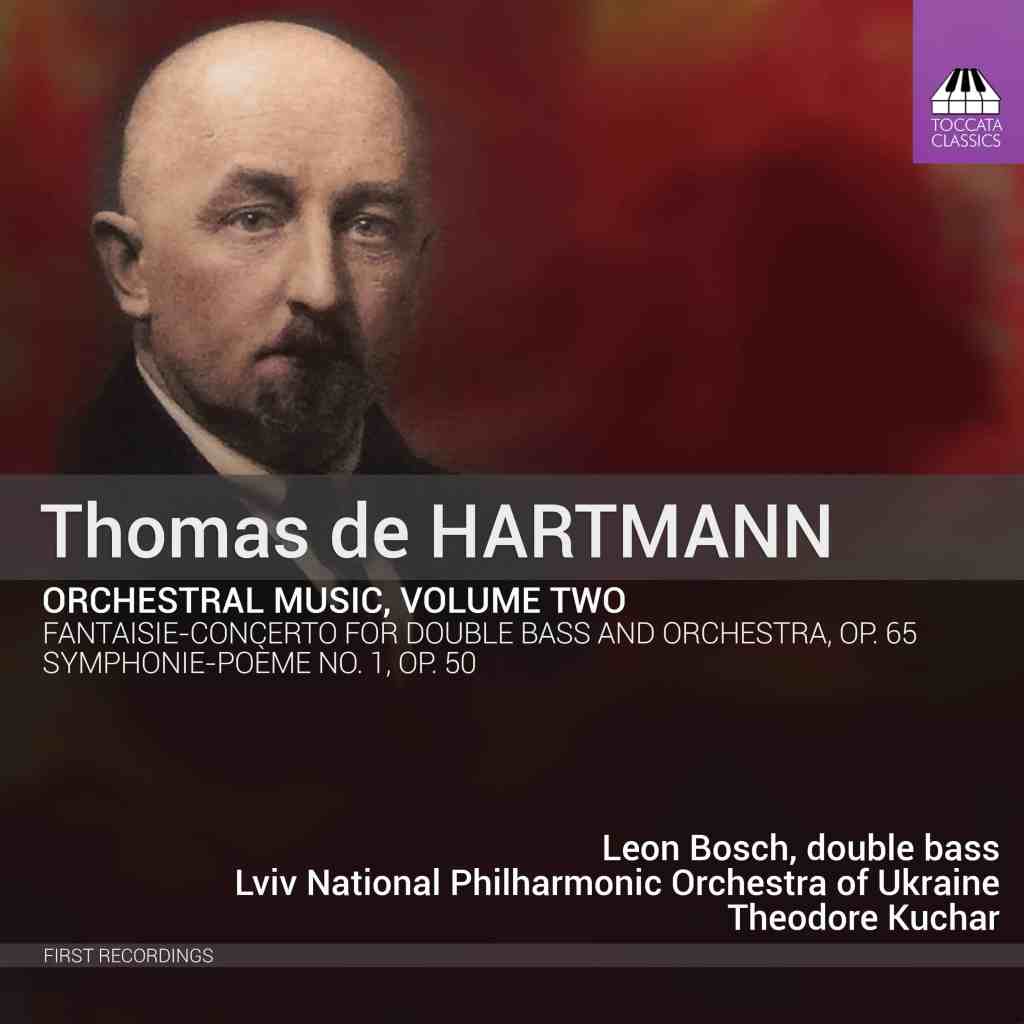
Leon Bosch (double bass), Lviv National Philharmonic Orchestra of Ukraine / Theodore Kuchar
Thomas de Hartmann
Symphonie-Poème no.1 Op.50 (1934)
Fantaisie-Concerto Op.65 (1942)
Toccata Classics TOCC0676 [81’49’’]
Producers and Engineers Andriy Mokrytskiy and Oleksii Grytsyshyn
Recorded 15-23 September at National Philharmonic Hall, Lviv
Reviewed by Richard Whitehouse
What’s the story?
Toccata Classics continues its exploration of orchestral music by Thomas de Hartmann with first recordings for two of his most characteristic works, idiomatically realized by the most fervent of present-day advocates and further confirming the intrinsic value of this composer.
What’s the music like?
De Hartmann heralded a return to original composition, after more than a decade focussed on his collaboration with philosopher Georges Gurdjieff, with the first of four pieces designated Symphonie-Poème. Those having heard the unfinished last of these (recorded on TOCC0633) may be taken aback by what they encounter – this 65-minute work drawing on such expansive symphonic precursors as Rachmaninoff’s Second and Glière’s Third, but with a formal logic and harmonic practice all its own. Not least in the imposing first movement, whose brooding introduction presages its synthesis of fantasia and fugue with an underpinning of sonata form to result in a construct as diverse in musical content as it feels cumulative in its overall design.
That the composer continued from here says much for his ambition, but the work does justify itself as a totality – whether in a Scherzo that unfolds as continually evolving structure rather than the usual ternary form, an Andante whose recourse to martial rhythm and Ukrainian folk -music gives it a distinctive colouring and emotional affect, then finale (interestingly marked Allegretto feroce) such as projects this covertly autobiographical statement defiantly into the ‘present’ through a trenchant rhythmic profile that builds inexorably toward the visceral close. Received with guarded admiration and not a little consternation at performances in Paris and Brussels in the mid-1930s, this is a major inter-war work as well warrants its belated revival.
So, too, does the Fantaisie-Concerto which de Hartmann wrote with the double-bass playing of Serge Koussevitzky vivid in his mind’s ear decades afterwards (the latter had long since turned to conducting, and it is not stated who premiered this piece). Drawing on elements of dance, the outer Allegros indicate those quizzical and capricious qualities which come to the fore in the composer’s later music, but the central Adagio leaves the most lasting impression. This ‘Romance 1830’ draws on an earlier setting of Vasily Zhukovsky, along with images of Glinka and his bass-playing servant, in what is a ‘song without words’ of no mean eloquence or evocative poise: qualities duly enhanced by the subtle understatement of its orchestration.
Does it all work?
Yes, though the larger work will likely take a few listens for its overall coherence to become manifest. That it does so is owing primarily to the conviction of de Hartmann’s thinking, but also to that of Theodore Kuchar in having the measure of this opulent score and conveying it to the musicians of the Lviv National Philharmonic Orchestra, who almost always sound unfazed by its demands. The concerto benefits from the expertise of Leon Bosch, affirming this as among a handful of pieces that establish the double bass as a concertante instrument in its own right.
Is it recommended?
Indeed – not least as the orchestral sound has been so sympathetically captured, detailed and spacious in equal measure, with informative notes by Elan Sicroff and Evan A. MacCarthy on life and work respectively. Cordially recommended, with the third instalment keenly awaited.
Listen & Buy
You can listen to sample tracks and purchase on the Toccata Classics website. For further information on the artists, click on the names for more on Leon Bosch, Theodore Kuchar and the Lviv National Philharmonic Orchestra Click on the name for more on composer Thomas de Hartmann
Published post no.2,158 – Wednesday 24 April 2024

